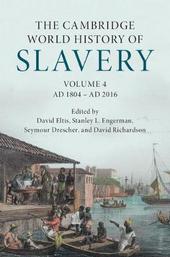
|
The Cambridge World History of Slavery: Volume 4, AD 1804-AD 2016
Hardback
Main Details
| Title |
The Cambridge World History of Slavery: Volume 4, AD 1804-AD 2016
|
| Authors and Contributors |
Edited by David Eltis
|
|
Edited by Stanley L. Engerman
|
|
Edited by Seymour Drescher
|
|
Edited by David Richardson
|
| Series | The Cambridge World History of Slavery |
|---|
| Physical Properties |
| Format:Hardback | | Pages:718 | | Dimensions(mm): Height 235,Width 160 |
|
| Category/Genre | Slavery and abolition of slavery |
|---|
| ISBN/Barcode |
9780521840699
|
| Classifications | Dewey:306.36209 |
|---|
| Audience | | Tertiary Education (US: College) | |
|---|
| Illustrations |
16 Tables, black and white; 3 Maps; 9 Line drawings, black and white
|
|
Publishing Details |
| Publisher |
Cambridge University Press
|
| Imprint |
Cambridge University Press
|
| Publication Date |
24 April 2017 |
| Publication Country |
United Kingdom
|
Description
Slavery and coerced labor have been among the most ubiquitous of human institutions both in time - from ancient times to the present - and in place, having existed in virtually all geographic areas and societies. This volume covers the period from the independence of Haiti to modern perceptions of slavery by assembling twenty-eight original essays, each written by scholars acknowledged as leaders in their respective fields. Issues discussed include the sources of slaves, the slave trade, the social and economic functioning of slave societies, the responses of slaves to enslavement, efforts to abolish slavery continuing to the present day, the flow of contract labor and other forms of labor control in the aftermath of abolition, and the various forms of coerced labor that emerged in the twentieth century under totalitarian regimes and colonialism.
Author Biography
David Eltis is an Emeritus Professor of History at Emory University, Atlanta and a Research Associate at the Hutchins Center, Harvard University, Massachusetts and at the University of British Columbia. His publications include Atlas of the Transatlantic Slave Trade (with David Richardson, 2010), The Rise of African Slavery in the Americas (1999), and Economic Growth and the Ending of the Transatlantic Slave Trade (1989). Stanley L. Engerman is Professor Emeritus at the University of Rochester, New York and a Research Associate at the National Bureau of Economic Research, Massachusetts. Among his books are Time on the Cross: The Economics of American Negro Slavery (with Robert William Fogel, 1974), Slavery, Emancipation, and Freedom: Comparative Perspectives (2007), and Economic Development in the Americas since 1500: Endowments and Institutions (with Kenneth L. Sokoloff, Cambridge, 2011). Seymour Drescher is Distinguished University Professor Emeritus of History and Sociology at the University of Pittsburgh. His numerous publications include From Slavery to Freedom: Comparative Studies in the Rise and Fall of Atlantic Slavery (1999), The Mighty Experiment: Free Labor vs Slavery in British Emancipation (2002), and Abolition: A History of Slavery and Antislavery (Cambridge, 2009). David Richardson is a Professor of Economic History at the University of Hull, and the former Director of the Wilberforce Institute for the Study of Slavery and Emancipation, Hull. He is author of the Atlas of the Transatlantic Slave Trade (with David Eltis, 2010), and editor of Routes to Slavery: Direction, Ethnicity and Mortality in the Transatlantic Slave Trade (with David Eltis, 1997), Extending the Frontiers: Essays on the New Transatlantic Slave Trade Database (with David Eltis, 2008), and Networks of Transcultural Exchange: Slave Trading in the South Atlantic, 1590-1867 (with Filipa Ribeiro da Silva, 2014).
Reviews'This excellent collection treats slavery as the truly global phenomenon that it was, and still is, and it looks at slavery within a broad range of forms of labor coercion. The editors have pulled together a team of outstanding authors, most of whom are established authorities on the subjects they discuss.' Martin Klein, University of Toronto 'With revisionary interpretations, this distinguished team of historians has produced an original, compelling and persuasive argument for the centrality of slavery in the shaping of modern history.' James Walvin, University of York 'This book is a thought-provoking intervention into the history and practices of slavery and other forms of coerced labor since the nineteenth century to the present, covering all parts of the world as well as major topics. It surely will spark a series of significant interdisciplinary debates, while future scholarship will rest on this thoughtful and expansive tome.' Toyin Falola, Kluge Chair in Countries and Cultures of the South, the Library of Congress 'This volume is brilliantly constructed with contributions from all parts of the world. It draws together the finest work on the history of forced labor between the Haitian Revolution and abolition. It is authoritatively researched, brilliantly presented, and clearly written - a welcome addition in every library.' Ira Berlin, University of Maryland 'This is a must-read for those interested in a comprehensive survey of nineteenth-century global slavery, its rise, decline, and aftermath. Not just an investigation of 'Second Slavery' in Africa, Asia and the Americas, this formidable volume examines a stunning range of coerced labor systems from a variety of rich perspectives, varying from the demographic to the cultural.' Philip Morgan, The Johns Hopkins University
|